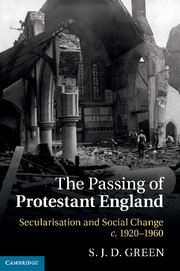Book contents
- Frontmatter
- Contents
- Acknowledgements
- Part I Outline of the problem
- 1 Towards a social history of religion in modern Britain: secularisation theory, religious change and the fate of protestant England
- 2 Religion in the twilight zone: a narrative of religious decline and religious change in Britain, c. 1920–1960
- Part II Disclosures of decline
- Part III Resistance, revival and resignation
- Conclusion: the passing of protestant England
- Index
- References
2 - Religion in the twilight zone: a narrative of religious decline and religious change in Britain, c. 1920–1960
Published online by Cambridge University Press: 10 January 2011
- Frontmatter
- Contents
- Acknowledgements
- Part I Outline of the problem
- 1 Towards a social history of religion in modern Britain: secularisation theory, religious change and the fate of protestant England
- 2 Religion in the twilight zone: a narrative of religious decline and religious change in Britain, c. 1920–1960
- Part II Disclosures of decline
- Part III Resistance, revival and resignation
- Conclusion: the passing of protestant England
- Index
- References
Summary
To those teetering upon the brink of their ‘third age’, any history of modern religion – certainly one concerned with the characteristic forms of religious organisation, religious practice or religious belief common in Britain between 1920 and 1960 – constitutes something of an intellectual and emotional ‘twilight zone’. This is because it is a subject in which detached historical understanding and engaged personal reminiscence are inextricably entwined. Objective analysis, whether in painstaking study of church attendance figures or by laborious extraction of popular religious attitudes from nebulous social surveys, points to the general decay of religion in twentieth-century British society. Subjective recollection, possibly through vague memories of a time when ministers of religion were men (never women) of unquestionable social standing, or even fond reminiscences of a lost world in which respectable men, women and children unselfconsciously obeyed the Word and bore witness to the deeds of Christ, has tended even more determinedly still in that direction. More determinedly but not more clearly: while most agree about the lamentable state of Britain's historic Christian churches, there is altogether less intellectual concurrence about the courses, causes and chronology of our broader religious inheritance. Conventional wisdom insists that Britain today is one of many secular societies. It is an unusually irreligious country. But when did it become so? Also how? And with what effect? About such pressing matters, there is altogether less consensus of opinion. Indeed, there is scarcely any broadly accepted explanation of those questions at all.
- Type
- Chapter
- Information
- The Passing of Protestant EnglandSecularisation and Social Change, c.1920–1960, pp. 29 - 92Publisher: Cambridge University PressPrint publication year: 2010



